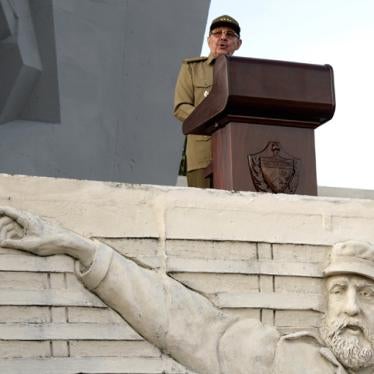Washington, DC
The Honorable Collin C. Peterson
Chairman, U.S. House Committee on Agriculture
1301 Longworth House Office Building
Washington, DC 20515
Dear Mr. Chairman,
I would like to congratulate you on convening this timely and important hearing of the United States House of Representatives Committee on Agriculture on US travel and agricultural trade with Cuba. Human Rights Watch fully supports the Travel Restriction Reform and Export Enhancement Act (H.R. 4645), which would remove obstacles to legal sales of US agricultural commodities to Cuba and abolish restrictions on travel to the island. We believe the proposed legislation, as well as similar legislation in the United States Senate (S. 1089), represents a necessary step towards ending a US policy that has failed for decades to have any impact whatsoever on improving human rights in Cuba.
In November 2009, Human Rights Watch released a 123-page report on human rights in Cuba under Raul Castro. The report concludes that rather than dismantle Cuba's repressive machinery, Raul Castro has kept it firmly in place and fully active. Scores of political prisoners arrested under Fidel Castro continue to languish in Cuba's prisons, and Raul Castro's government has used draconian laws and sham trials to incarcerate scores more who have dared to exercise their fundamental freedoms.
The death in custody on February 23, 2010, of political prisoner Orlando Zapata Tamayo after an 85-day hunger strike served as a tragic reminder of the abuse suffered by those who dare to criticize the Castro government, and the lack of recourse for victims of repression. In the aftermath of Zapata's tragic death, some have argued that the US embargo policy should not be changed, or that restrictions on trade and travel should be tightened further. Human Rights Watch disagrees.
Efforts by the US government to press for change by imposing a sweeping ban on trade and travel have proven to be a costly and misguided failure. The embargo has done nothing to improve the situation of human rights in Cuba, and imposes indiscriminate hardship on the Cuban population as a whole. It has provided the Cuban government with an excuse for its problems and pretext for its abuses. Rather than isolating Cuba, the policy has isolated the United States, enabling the Castro government to garner sympathy abroad while simultaneously alienating Washington's potential allies.
There is no question: the Cuban government bears full and exclusive responsibility for the abuses it commits. However, so long as the embargo remains in place, the Castro government will continue to manipulate US policy to cast itself as a Latin American David standing up to a US Goliath, a role it exploits skillfully. Ending the travel ban and removing obstacles to agricultural trade are steps in the right direction toward reforming this failed policy, and Congress should act swiftly to pass the Travel Restriction Reform and Export Enhancement Act.
Eliminating barriers to agricultural trade and lifting the travel ban will not, by themselves, bring an end to the Raul Castro government's repression. As a result, Human Rights Watch recommends that the US government replace its failed embargo policy with a more effective, multilateral approach. Our report lays out a proposal for the United States to work with allies in the European Union, Canada, and Latin America to forge a new coalition that will exert targeted pressure on the Raul Castro government to end its human rights abuses.
I would ask that you please share this statement with members of your committee, and I would be very grateful if you would include this letter in the record of your hearing.
Sincerely,
José Miguel Vivanco
Executive Director, Americas Division
Human Rights Watch







